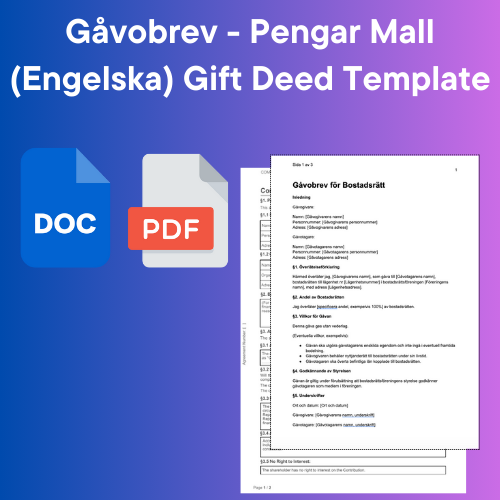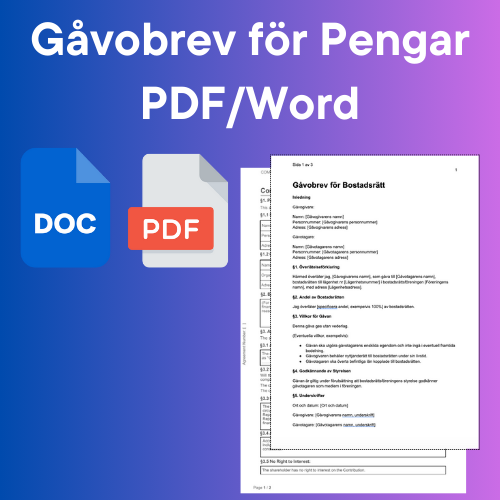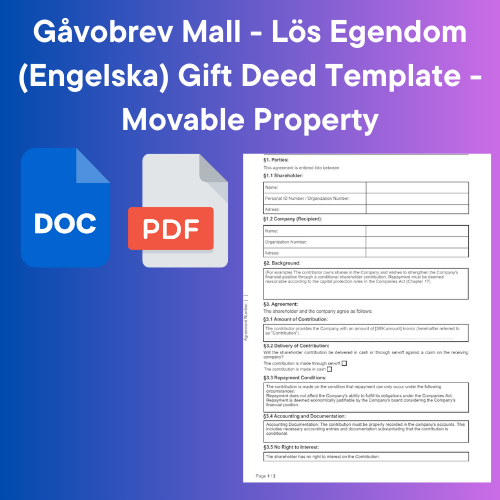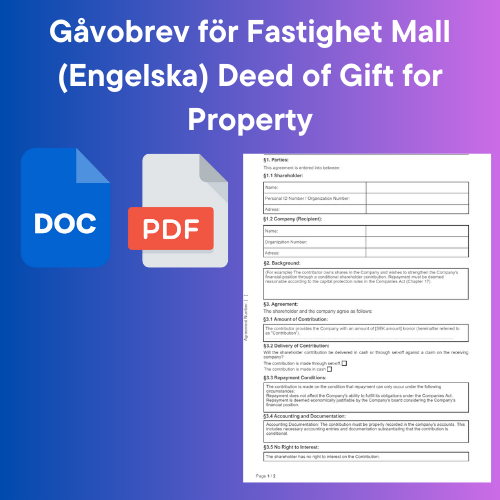Gift Certificate FAQ & Common Mistakes
Share
Gift Certificate FAQ & Common Mistakes
A gift deed is a legal document used to regulate the transfer of a gift. It can be about real estate, condominiums, money or other movable property. The purpose of a gift deed is to clearly specify the terms of the gift and avoid future disputes. This article will highlight common questions and mistakes related to gift letters, citing relevant legislation and practice examples from court cases.
Table of Contents
- Why is a gift letter important?
- Form requirements for gift letters
- Frequently asked questions about gift certificates
- Common mistakes when creating gift certificates
- Court cases and practice
- Legislation
- Conclusion
Why is a gift letter important?
A properly prepared gift letter can prevent misunderstandings and ensure that the gift is handled according to the wishes of the donors. In the case of gifts of greater value, such as real estate and condominiums, it is also a legal requirement to draw up a deed of gift for the transfer to be valid.
Form requirements for gift letters
In order for a deed of gift to be valid, especially when transferring real property, certain formal requirements must be met:
- Written document: The deed of gift must be in writing.
- Declaration of transfer: It must be stated that the donor transfers the property to the recipient.
- Specification of the gift: It must be specified what percentage of the property is transferred.
- Signatures: Both the gift giver and the gift recipient must sign the gift deed.
When transferring real estate, it is also required that the donor's signature be witnessed by two people and that the deed of gift be registered with the Land Survey in order for the recipient to be able to apply for deed.
Frequently asked questions about gift certificates
1. Is a promise to give a gift binding?
Yes, a gift promise is binding if it is made through a written gift deed or on a solemn occasion in front of witnesses.
2. Can a gift promise be revoked?
Generally speaking, a gift promise cannot be revoked if it has been made in a binding manner. However, some gifts can be recovered if the donor is declared bankrupt within three years of the gift.
3. What applies without a gift certificate?
Without a gift deed, a gift only becomes valid when it has been handed over to the recipient. Before then, the giver may regret it, unless the promise was made on a solemn occasion.
Common mistakes when creating gift certificates
1. Not specifying conditions
A common mistake is not to specify conditions for the gift in the gift deed. Conditions may include that the gift must be separate property, which protects it in the event of a divorce, or that the gift must not count as an advance on inheritance.
2. Lack of formality
Failure to meet the formal requirements, such as witnessing the transfer of real property or registering the gift with the Land Survey, can result in the gift becoming invalid.
3. Improper storage
Another mistake is not keeping the gift certificate in a safe place. It is important to have access to it in the event of a dispute.
Court cases and practice
In jurisprudence, several cases have shown the importance of correctly drawn up deed of gift. An example is a case where a deed of gift did not specify that a property would be single property. In the event of a divorce, the property was then considered to be matrimonial property, which led to a division of the property's value between the spouses. This could have been avoided with a clear condition in the gift deed.
Legislation
According to the Marriage Code (1987:230) and the Parentage Code (1949:381), there are specific rules for gifts between spouses and to children. For gifts to children, it is important to state whether the gift is to be seen as an advance on inheritance or not, otherwise it is assumed as an advance on inheritance according to the Inheritance Code.
Conclusion
Drawing up a gift deed is an important measure to ensure that a gift is handled according to the wishes of the donors and to avoid future conflicts. By following the formal requirements and specifying clear conditions, you can create security for both donor and recipient. Be careful to fulfill all form requirements and keep the document safe for the gift to be valid and safe.
By understanding the legal aspects and avoiding common mistakes, you can ensure that the gift deed fulfills its function and that the transfer takes place smoothly and correctly.




